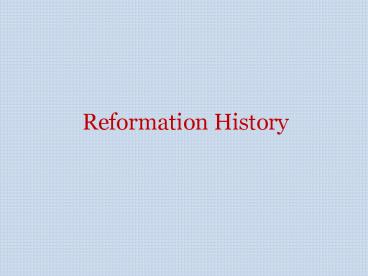Reformation History PowerPoint PPT Presentation
1 / 11
Title: Reformation History
1
Reformation History
2
Immorality of the Clergy. Celibacy for clergy
became Roman Church law in 1079. This mandate
tempted all kinds of immorality. The abodes of
the clergy were often dens of corruption. It was
a common sight to see priests frequenting the
taverns, gambling, and having orgies with
quarrels and blasphemy. Many of the clergy kept
mistresses, and convents became houses of ill
fame. In many places the people were delighted at
seeing a priest keep a mistress, that the married
women might be safe from his seductions.
Salvation, taken from the hands of God, fell
into those of the priests, who set themselves in
the place of our Lord. Souls thirsting for pardon
were no more to look to heaven, but to the
Church, and above all to its pretended head. To
these blinded souls the Roman pontiff was God.
Hence the greatness of the popes - hence
unutterable abuses
- The Beginnings of Religious Reforms
- Corrupt Priesthood
- Moral Decay of the Church
- Decline of Papal Power
- People of the Reformation
3
- Peter Waldus
- 12th Century Reformer
- Followers attempted to reduce the
ecclesiastical government in
their lives - Considered every Christian qualified and
authorized to instruct and exhort - Confession to a priest not necessary
- Prayer for the dead useless and vain
4
- John Wycliffe (1320-1324)
- Opposed the Popetwo
- officers in the Church
- elders and deacons
- Formed societies to preach to
- the poor Lollards
- Scriptures were the only
- source of authority
5
- May 4, 1415 the Council of
- Constance declared him a
- hertic and commanded his
- books to be burned and his
- body exhumed and burned
- 12 years later this was carried
- out and his ashes were thrown
- in the river Swift.
- Translated Bible into English
6
- Martin Luther (1483-1546)
- Challenged authority of pope
- Luther was angered by the sale of indulgences led
to nailing 95 theses to the church door - Bible is the only infallible source of religious
authority - All baptized Christians are a universal priesthood
7
- Luther declared early church had no pope
- 1522 published the N.T. in German
8
- John Calvin (1509-1564)
- Literal interpretation of Scripture
- Church organization
- Pastors
- Teachers
- Elders
- Deacons
9
- Invited to build Reformed church in Geneva
- Imposed a strict morality
- Thrown out of Geneva
- Moved to Strasbourg were he began writing
commentaries on the Bible - Invited back to Geneva
10
- Calvins doctrine accepted by the masses
- Practically all denomuinational churches are
Calvinist to some degree - Predestination the core of Calvins belief
- Calvinism can be seen in the acrostic Tulip
11
T- Total Depravity U Unconditional Election L
Limited Atonement I Irresistible Grace P-
Perseverance of the Saints

